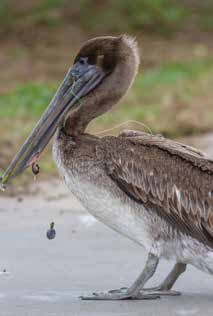Joanna Fitzgerald – Director of von Arx Wildlife Hospital tells us…
 Most animals admitted to the von Arx Wildlife Hospital at Conservancy of Southwest Florida suffer from injuries or illnesses caused by humans. We put together a list of things to do – or not do – to help prevent injury to wildlife.
Most animals admitted to the von Arx Wildlife Hospital at Conservancy of Southwest Florida suffer from injuries or illnesses caused by humans. We put together a list of things to do – or not do – to help prevent injury to wildlife.
1. Prevent your pet cats and dogs from attacking and/or playing with wildlife. Don’t allow dogs to run without supervision and raise cats indoors. Many injured animals are brought to the von Arx Wildlife Hospital with fatal wounds from dog or cat attacks.
2. Educate children to respect all wild creatures and their habitats. Wild animals are not playthings. Children should not throw rocks at wildlife or disturb them if they are resting on the beach or roosting in trees.
3. Pick up litter that could harm wildlife, including six-pack rings, plastic bags, fishing tackle, and old pieces of carpet or netting.
4. Do not trap or in any other way cause harm to wildlife.
5. Leave infant wildlife alone. They are seldom truly orphans. A parent may be nearby foraging for food or will return at dusk. If you find young birds on the ground, attempt to return them to their nest. If they’re learning to fly, place them in a tree for safety if pets are nearby.
6. Be alert when driving, especially in rural areas, to avoid hitting wildlife. Please stop when possible and move turtles from the roadway or shoulder. Always move them in the direction they were heading.
7. Check trees before trimming or cutting them down to make sure there are no active nests. If dead trees pose no hazard, leave them standing. They provide homes for a variety of wildlife, such as woodpeckers, owls, and squirrels. Try to avoid trimming trees during the spring and summer nesting seasons.
8. Use non-toxic products on your lawn and garden when fertilizing.
9. Plant native trees and shrubs to provide homes and food sources for wildlife. Many migrating species are attracted to areas with native vegetation. 10. Do not attempt to raise or keep wildlife as pets. Not only is it illegal, but wild animals do not make good pets and captivity poses a constant stress to them. Young wild animals raised without contact with their own species fail to develop survival skills and fear of humans, virtually eliminating their chances of surviving in the wild.
11. Alert birds to large expanses of glass in your home by hanging reflective streamers nearby. Reducing the reflection should cut down on the number of birds who collide, often fatally, with doors and windows.
12. Do not leave fishing line or fish hooks unattended and retrieve any kite string left on the ground or entangled in trees.
13. Look before mowing your lawn. Walk through the area to make sure no rabbits or ground nesting birds are in harm’s way.
14. Do not feed wildlife. Feeding encourages animals to become dependent on handouts, lose their fear of humans, and to congregate in unnaturally large groups, increasing the chances of disease transmission.
Providing medical care to injured native wildlife has been a priority of the Conservancy of Southwest Florida since 1979. This year, the von Arx Wildlife Hospital admitted more than 3,700 patients including small mammals, reptiles and birds. The wildlife hospital is open 365 days a year from 8 a.m. to 8 p.m.
If you find injured or orphaned native wildlife, contact the von Arx Wildlife Hospital at Conservancy of Southwest Florida at 239-262-CARE (2273)



Leave a Reply
Want to join the discussion?Feel free to contribute!